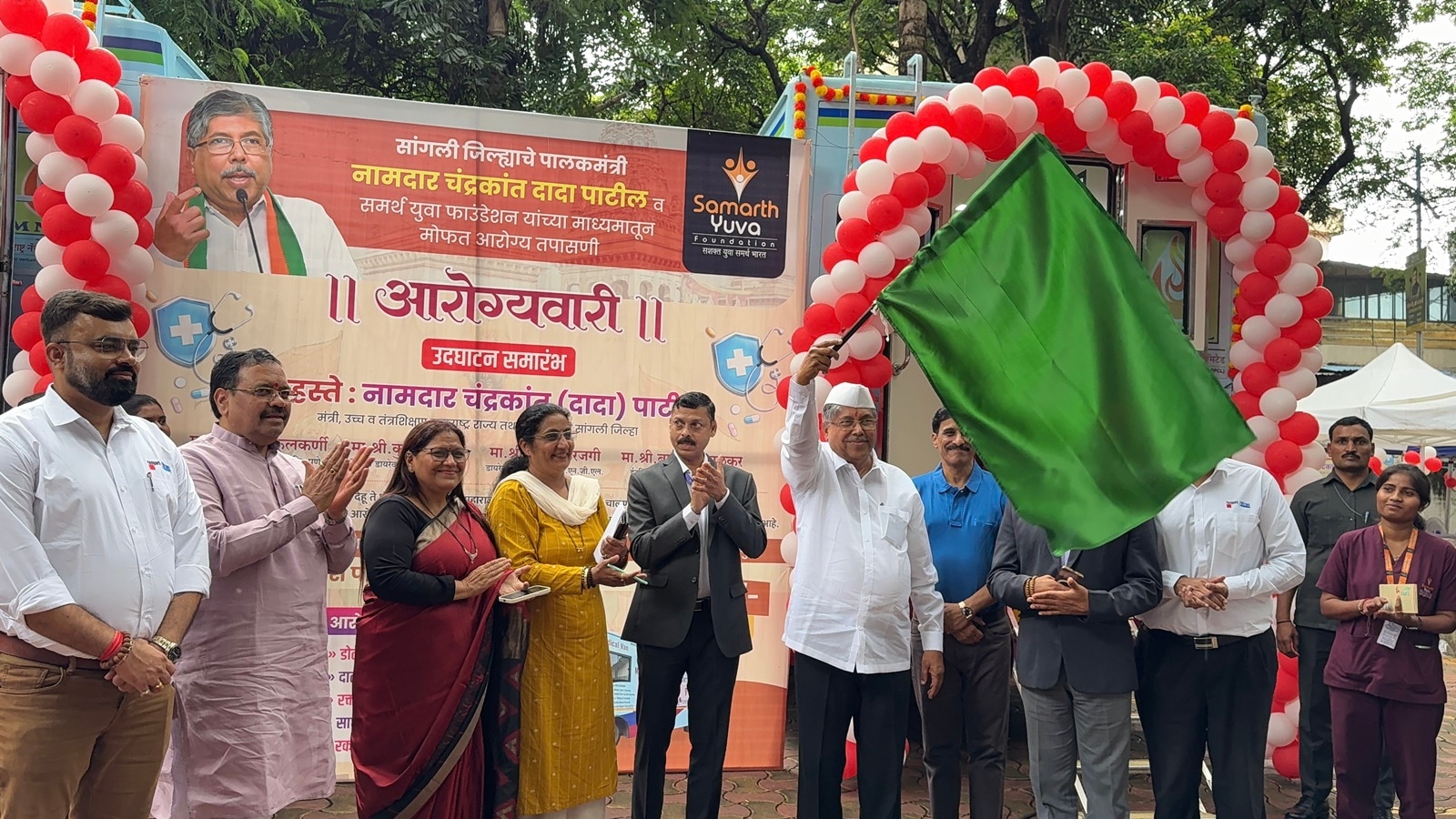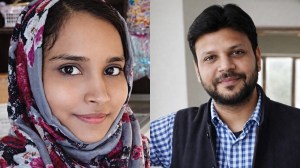Click here to join Express Pune WhatsApp channel and get a curated list of our stories
As Palkhi processions enter Pune, streets turn sanctuaries of devotion, hospitality
Their arrival is not just a procession, but a moving pilgrimage of love, discipline, and surrender that transforms the city into a living, breathing prayer.
 This initiative, jointly organised by Samarth Yuva Foundation and the Guardian Minister of Sangli District, Namdar Chandrakant (Dada) Patil, was dedicated to providing essential medical care to Warkari Mata Maulis walking in the annual Pandharpur Wari. (Express Photo)
This initiative, jointly organised by Samarth Yuva Foundation and the Guardian Minister of Sangli District, Namdar Chandrakant (Dada) Patil, was dedicated to providing essential medical care to Warkari Mata Maulis walking in the annual Pandharpur Wari. (Express Photo)Written by Siddhi Patil,
Pune witnessed a timeless spectacle of faith and surrender on Friday, as lakhs of Warkaris walk into the city from different corners of Maharashtra, lost in the rhythm of “Mauli Mauli!” and completely immersed in devotion to Lord Vitthal.
Their arrival is not just a procession, but a moving pilgrimage of love, discipline, and surrender that transforms the city into a living, breathing prayer. Rain or shine, food or no food, bed or bare ground nothing stops the Warkari, who trusts completely in the path and in Vitthal’s grace.
“We don’t worry about anything. Vitthal takes care of us,” says Bhaskar Maharaj Jadhav, a 74-year-old Warkari from Jalgaon, his voice cracking with age but steady with faith. He has walked in the Wari for over 25 years. “We are not homeless. The sky is our roof, and this road is our temple.”
As they enter Pune, the city greets them not as guests but as returning family. From Dehu and Alandi, from Nashik to Nanded, processions carry the padukas (symbolic sandals) of Sant Tukaram Maharaj and Sant Dnyaneshwar Maharaj, accompanied by dhols, veenas, chants, and tears.
But while the Warkaris bring their unshakable faith, Punekars bring their unmatched hospitality.
At a small pandal near Dagduseth Temple, Geeta, a housewife from Dhayari, stirs a massive pot of khichdi with her daughter and son.
“We come every year as a family to serve food to Mauli’s people,” she says, her face glowing with pride. “This is our offering. We don’t have much, but we cook with love. No one should go hungry.”
She isn’t alone. Across the city, from Sinhagad Road to Shivajinagar, locals open their homes, shops, and hearts offering bananas, tea, medicines, even slippers to the pilgrims who have walked for days.
For some, this year’s Wari is their first. Shraddha and Prathamesh, young siblings from Solapur, are here to experience the Wari with their grandparents. “We always saw it on TV, but this year we decided to walk. We wanted to feel it, live it, and understand what draws millions to Vitthal.”
There is a different energy in the air. Alandi Palkhi, expected to arrive this evening, is being awaited with bated breath. Streets are being swept, rangolis drawn, and bhajans echo through the night.
“We keep looking at the road, waiting for the first dhol to hit,” says Sudarshan, a teenager from Fergusson College Road, who bunked lectures just to see the procession. “It gives me goosebumps. It’s not just tradition, it’s emotion.”
In a world obsessed with speed, the Warkari walk reminds us of stillness. In a time of consumption, they teach us contentment. In an age of anxiety, their surrender is a revolution.
As night falls and Pune fills with the scent of tulsi, wet soil, and steaming bhakris, one truth becomes clear,when the Warkaris come, they bring Vitthal with them.
Sairam Kamble, a 70-year-old farmer from Washim, has been part of the procession for over a decade. “I am an old man now. I have a wife who is happy and healthy, children who are settled in their lives, and a flourishing farm. A decade ago, I decided to take the spiritual path and visit my Mauli every year,” he says with quiet contentment.
Ten-year-old Kartik, also from Washim, joins the journey with his family. “I come here because it’s fun, and all my friends and family are with me. We walked from Washim to Pune and now will walk till Pandharpur. We return by bus, so I don’t miss school exams,” he says cheerfully.
Forty-year-old Sheela Jagdale is a widow and also a daily wage worker. She says, “After my husband died, I had nothing left to look forward to. I joined the Wari with others from my village, and in this crowd, I found hope again. People hear my story and help without expecting anything in return. That’s what spirituality does,”
Rohini Patil, a 50-year-old entrepreneur from Pune, walks with the Sant Dnyaneshwar Palkhi every year from Pune to Saswad. “I began walking here 5 years ago out of a curiosity that I had as a child. But over the years, I discovered the beauty of humanity here. No one asks about your caste, language, or status. We all walk with one identity: as devotees of Mauli. Even though my health isn’t perfect, I keep walking for the kindness and the spiritual energy that fills the air,” she says.
Aarogyawari
In an initiative blending spirituality with healthcare, a free health check-up camp under the Arogyawari programme was inaugurated on Friday at Ranade Institute, Pune. This initiative, jointly organised by Samarth Yuva Foundation and the Guardian Minister of Sangli District, Namdar Chandrakant (Dada) Patil, was dedicated to providing essential medical care to Warkari Mata Maulis walking in the annual Pandharpur Wari.
The event was inaugurated at the auspicious hands of Chandrakant Patil, Minister for Higher and Technical Education, Maharashtra State.
He emphasised the spiritual and social importance of this service, stating, “Serving the Warkari community is akin to receiving blessings from the divine. Women go through many life stages and it’s crucial to care for their health with priority.”
Rajesh Pandey, president of Samarth Yuva Foundation, says that “last year, the Arogyawari mobile healthcare bus served for 18 days and helped nearly 1,29,000 pilgrims.” He reaffirms the foundation’s commitment to health and social welfare, especially for women walking the arduous journey from Alandi and Dehu to Pandharpur.
Health services at the Aarogyawari include breast and oral cancer screening, blood pressure and sugar testing, cholesterol check, eye and dental examinations, blood tests and screening of blood components and general health check-ups.
Special mention was made by Bageshree Manthalkar, independent director, Maharashtra Natural Gas Limited, who stated that a tie-up with Deenanath Mangeshkar Hospital ensures that pilgrims found with health issues during screening can access further treatment without delay.
Sanjay Kulkarni also urged women not to ignore health issues due to fear or hesitation, highlighting the importance of timely medical attention.
“We walk for devotion, but this health camp reminds us that our bodies, too, need care. It’s the first time I’ve done a check-up in years, I feel seen and cared for,” said Vimalbai Shinde, a 72-year-old Warkari from Beed district, with tears of gratitude in her eyes.
The initiative under the motto “Sashakt Yuva, Samarth Bharat” once again proves that meaningful social service can walk hand-in-hand with religious devotion, offering care, compassion, and commitment to those who need it the most.
Click here to join Express Pune WhatsApp channel and get a curated list of our stories







